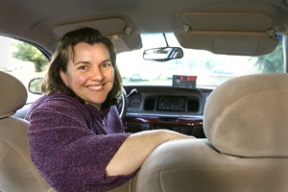A taxi driver’s photos chronicle a decade of fares, and a changing island.
It began a decade ago with a simple question: dispatcher Lucy Munson wanted to know what Magic looked like.
So Bainbridge Island Taxi driver Jewel Fraser Clearwater took a picture of her regular passenger, Magic the Clown, who adorns highway signposts near Sportsman Club Road with balloons.
There would be more to follow. Soon after Clearwater moved to Bainbridge in 1996 and began driving a cab, she began taking photographs of her fellow drivers, customers and surroundings.
Her images, now a photo montage called “Memory Land,” is featured in the Ninth Annual Celluloid Bainbridge Film Festival this weekend.
“ I took the job for two weeks, a year at most,” she said. “I just ended up staying for 10 years. I’m fascinated with listening to people’s stories. People tell you amazing things in the car.”
Clearwater’s fares are a varied lot. The taxi company has a contract to give Department of Social and Health Services clients rides, and so they drive Serenity House residents.
The service has “pick-ups” all over Kitsap, and will even drive people to the ocean.
“I had my biggest ‘no-show’ in La Push,” Clearwater said.
Often, the drivers take travelers to SeaTac Airport. Clearwater recalls one memorable ride from a time when many of the taxis were “in pretty bad shape,” and she drove island surgeon Dick Schwartz to the airport in a cab trailing plumes of black smoke.
“We’ve since become friends,” Clearwater said. “He’s very funny and he doesn’t put on airs.”
While her camera lens is pointed outward, Clearwater’s story is implicitly also about the extended family that is the crew of Bainbridge Island Taxi – a work environment where people look out for each other, she says. That hasn’t changed, even as ownership of the company passed to new ownership.
When cab driver Kevin Wood’s son had cancer six years ago, the drivers donated their tip money. The film is dedicated to former driver Charles Angell, who recently died of pancreatic cancer and who parked the off-duty cabs at his home.
There are images that speak to the life of the “taxi people.” An island address post adorned with at least 20 house numbers is an insider’s joke – the driveway from hell.
Photos of Commuter Comforts baristas abound, because the coffee stand near the ferry is an important part of taxi life. There are the regular ferry terminal hangers-on who become friendly with the drivers.
Clearwater says she has always liked how a photograph can freeze a moment.
“As a kid looking at black-and-white photographs of my parents when they were young,” she said. “I’d want to step through the photographs to see what the 1940s looked like, and what my parents were like as teenagers.
“So to me, photographs are portals of time. And I can’t believe how fast these (photographs) have become portals of time. I thought it would take 20 years, but it’s just a few years.”
Clearwater’s photographs chronicle change.
Kids grown and gone smile as middle schoolers. People long dead link arms on front steps. Virginia Barnett and her late husband, Arthur, stand happily side by side.
The images flash by, the faces dissolve one into the other. The photos document island places now altered beyond recognition.
“Oh, that house, that was on Lovell,” says Clearwater of one image. “Oh, that’s the site of the Pavilion… This is across from Ace (Hardware). I loved that little forest. It was so tiny, but I loved it.
“It’s weird. Every time I drive around, especially downtown, I keep going ‘that’s new, that’s new, that’s new.’ And I’ve only been here 10 years.”
But the melancholy of time’s passage is offset, for Clearwater, by the sheer fascination of people’s stories.
Her customers have ranged from a paranoid schizophrenic to a woman who survived a suicide attempt that put a bullet in her brain. Clearwater’s engagement with her customers’ life histories is clear when she talks about one rider, a musician who had a stroke after he got off drugs.
“He’s the only one I’m mad at God with,” Clearwater said, “because he tried so hard to do such good things. Now he can barely move and he can’t talk. He was brilliant in his communication. And now he can’t talk.”
No mere witness to the lives of her charges, Clearwater holds a master’s degree in psychology from University of Massachusetts in Amherst and calls herself “a taxi therapist.”
“We are their family,” she said. “They get connection and attention. People who would never sit in a counseling office, they talk. They get in the car and just tell you their stories. I once saw a reader board sign that said, ‘Be kind, for everyone you meet is fighting a great battle.’
“That’s my philosophy, that’s what I believe in. Because there are so many stories out there that are incredible.”
**************************************************************
Celluloid Bainbridge
Celluloid Bainbridge is the Bainbridge Island Arts & Humanities Council’s annual festival of movies that were either filmed on Bainbridge Island or feature an islander in the cast or crew. The ninth annual festival will celebrate local filmmakers, both established and aspiring, and provide a venue for the filmmakers to share their work with the community. The event is from 12:30 p.m. to 6 p.m. March 10 and 10 a.m. to 8 p.m. March 11 at the Historic Lynwood Theatre. New to the festival this year are filmmaker forums on Saturday in the former Walt’s Lynwood Market space. Topics are “How to Get Your Film Distributed,” from 9 to 10:30 a.m. and “Just Good Movies: How to Make Them.” from 10:30 a.m. to noon. On Sunday Walt’s will be a place to meet up with friends, talk with filmmakers, check out displays, get a copy of your favorite Celluloid Bainbridge entry and catch selected shorts you may have missed. Information: 842-7901



